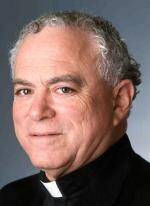Eighth-graders in Catholic schools in Chicago a half-century ago had a lot on their minds. Beyond coping with being a teenager and surviving adolescence, deciding which high school to attend loomed large. Often family tradition was decisive. Other times it was where friends decided to go. That’s how I ended up at St. Ignatius. At 13, I had made a life decision.
Back then we did not hear much theory about Jesuit education. We just lived it. It got into religion courses, of course, but also into our English and Latin textbooks, some of the history, not much in chemistry or physics. Religious images were everywhere, and daily Mass was required, unless you lived south of 87th Street, about 10 miles from school.
Much of that changed during my years at St. Ignatius (1956-60), as much in the church at large was changing. Since then, the talk about what Jesuit education means—what makes it distinctive, what it demands, what results it strives for—has become more explicit.
Two weeks ago, a small group gathered at Rockhurst University in Kansas City, a national seminar called Conversations on Jesuit Higher Education. This seminar grew up after a meeting at Georgetown in 1989 when some Jesuit leaders decided to get more deliberate about the term “Jesuit education,” to study its character and plan for its future. The seminar gathers three weekends a year to discuss issues and twice a year publishes the journal Conversations. Ten of the members are drawn from among the 28 Jesuit colleges and universities. Serving as the editor of the journal, I am number 11. The meetings and membership on the board rotate among the schools, and members generally serve three-year terms.
The meetings are a privileged opportunity to know the world of Jesuit higher education. We discuss issues current in the schools and brainstorm topics for upcoming editions of the magazine. We also discuss specific articles and possible authors to open up those topics. And we discuss manuscripts authors have sent in.
A valued feature of the meetings is lunch with a faculty group and another with students. These gatherings are deeply informative, inspiring and challenging. Some concerns are common to the schools. Faculty members talk about adjuncts, workloads and the costs of education. And they talk about mission: How does the rhetoric of Jesuit education seep down into the everyday reality of courses and programs?
Students are usually optimistic and love their school, a special place for them. And they know about the Jesuit factor; they know the language and the images; they know it makes their scholastic experience different, special.
The students I sat with at lunch in Kansas City—Audrey, Matt, Morgan and Shayla—showed a high level of understanding of what their Jesuit education means, and they enjoy great rapport with their teachers.
They discussed how well students are incorporated into the mission or the Jesuit ideal, but they also saw a need for better expression of the core values, Jesuit values. Still, the values are there. And some wanted more explicit reference to Jesus and the church.
Most students who enter a Jesuit school come from a family that has gotten them this far, a family that typically supports them and shares their dreams. They live their college years with hopes for a great future, with ideals and maybe some fears. While at school they receive something special beyond credits and a diploma, important as those are. Will this something special last? Will this Jesuit thing be something they keep and share? Will they use it to build a better world, to do more for that world, to find God working in it and be part of that work? That spells success in Jesuit education.








